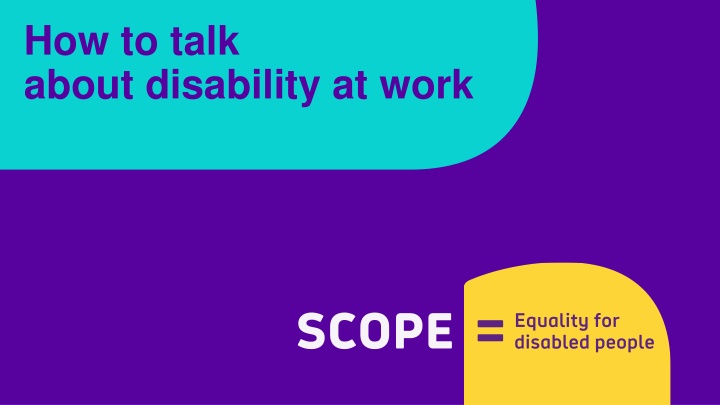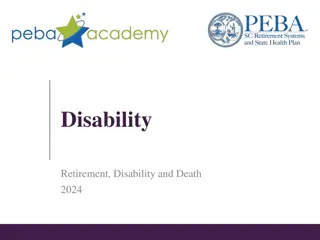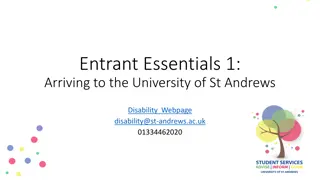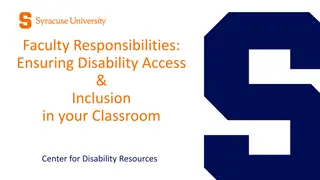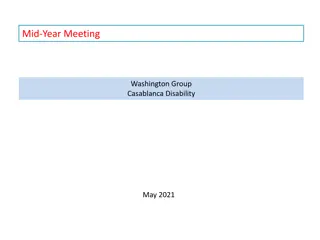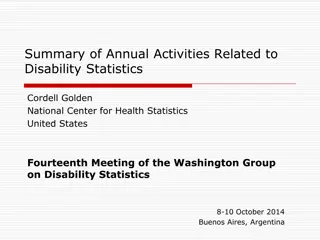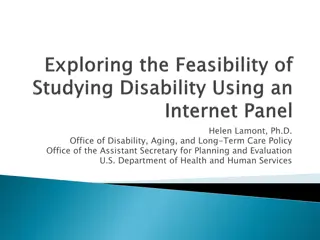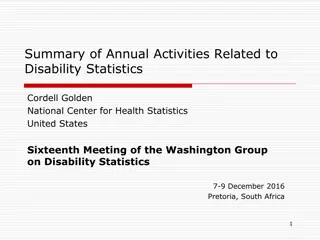Talking About Disability at Work: Tips and Guidelines
Discussing disability at work can be sensitive. Learn about your rights, reasonable adjustments, and the importance of communication. Understand the Equality Act and how to make reasonable adjustments for disabled employees like Lucy, who has ADHD.
Download Presentation

Please find below an Image/Link to download the presentation.
The content on the website is provided AS IS for your information and personal use only. It may not be sold, licensed, or shared on other websites without obtaining consent from the author.If you encounter any issues during the download, it is possible that the publisher has removed the file from their server.
You are allowed to download the files provided on this website for personal or commercial use, subject to the condition that they are used lawfully. All files are the property of their respective owners.
The content on the website is provided AS IS for your information and personal use only. It may not be sold, licensed, or shared on other websites without obtaining consent from the author.
E N D
Presentation Transcript
How to talk about disability at work
Objectives How to talk about disability, impairment or health condition when finding work Learn about Equal Opportunities Learn about reasonable adjustments and Access to Work Skills practice in talking about disability
Talking about disability There are strict rules about telling an employer about an impairment or health condition. You do not have to tell them. It's up to you to decide if and when you let an employer know.
Reasons for talking about disability You can make a complaint under the Equality Act if you feel you have received unfair treatment as a result of mentioning that you are disabled. If you have not told the employer, they can say that they did not know that they needed to make reasonable adjustments for you as a disabled applicant. By law, an employer cannot refuse to give you a job because you are disabled or have a health condition. There needs to be a genuine reason.
Equality Act The Equality Act 2010 requires employers to make 'reasonable adjustments' to allow disabled people to access the same opportunities as non-disabled people. But what is reasonable for 1 organisation may be impossible for another.
Activity 1 Reasonable adjustments
What could be a reasonable adjustment? Adjustments to buildings ramps, lifts and so on Altering working hours Allowing absence for rehabilitation or treatment Arranging or giving extra training Acquiring or modifying equipment Modifying instructions or reference manuals Providing a reader or interpreter Providing supervision Adjustable chairs or desks
Remember The most important thing to remember is that 1 size does not fit all.
Activity 2 Reasonable adjustments for Lucy
Reasonable adjustment for Lucy Lucy has ADHD and has secured a job as an administrative assistant in an office. What adjustments could she ask for to make her life at work easier?
Examples of reasonable adjustments Lucy could ask for Offer increased supervision, frequent check-ins and feedback (such as daily or weekly planning and progress meetings with line manager) Break down tasks into clear, small steps Give instructions and meeting notes in writing rather than verbally Operate a buddy system for tasks to help maintain focus
Activity 3 Reasonable adjustments for you
Reasonable adjustments for you As a disabled person, you can get funding from Access to Work for specialist equipment, extra transport costs and the help you need to do the job. Employers often worry about the potential costs of taking on a disabled employee. Many are not aware of the Access to Work scheme. Making your employer aware of the help available will allow them to focus on your skills.
Access to Work Access to Work is a government grant scheme which supports disabled people in work. Who is eligible for Access to Work? You must: be over 16 have any condition or impairment that affects your ability to do your job or travel to work be in or about to start paid work (this includes self-employment) Access to Work can only assess you if you have confirmed a job offer or are employed. You cannot be assessed before getting a job offer. You do not need to be a UK citizen, but you must live and work in England, Scotland or Wales to apply. Access to Work applies to any paid job of any length of time. This includes part-time work, temporary work and work trials organised by Jobcentre Plus.
Examples of what Access to Work might fund Adaptations to premises and equipment Specialist equipment or software A support worker, such as a driver or job coach British Sign Language interpreter or lip speaker Extra transport costs, such as a taxi where no public transport is available Adapted equipment, such as chairs and desks
What Access to Work cannot fund There are some things Access to Work cannot fund, including: changes that your employer must make under the Equality Act 2010 (reasonable adjustments) support that you or your employer put in place before you applied to Access to Work equipment that is standard for the job, such as a standard computer chair a diagnosis, such as a dyslexia assessment
Access to Work: useful things to know You do not need to get disability benefits to apply for Access to Work. Your benefits will not affect your application. Your employer cannot apply for you. You must apply for Access to Work yourself. You can apply online, by phone or you can ask for a paper form. If an employer has not heard of Access to Work, show them this factsheet. If you apply after you have been in the role for more than 6 weeks, your employer might need to contribute towards the cost of things paid for by Access to Work. Access to Work funding is ongoing. Access to Work will review your circumstances and support needs after 3 years or if your condition changes.
Disability Confident scheme Some employers are part of the Disability Confident scheme, run by the Department for Work and Pensions (DWP). Look for these symbols on job adverts. Only Level 3 leader organisations have been assessed by someone independent to see if they're meeting their commitments to disabled people.
Why talk about disability Your life as a disabled person may have given you unique experiences that may be useful in the workplace. For example Having autism might give you specialist knowledge about a certain area such as transport.
When to talk about disability? If you decide to tell a potential employer, the next stage is to think about when you want to tell them. CV and cover letters Application form Equal Opportunities form Interview
If your interviewer asks about your condition or impairment Your interview should not focus on your condition. Your interviewer might ask questions about your condition or how it affects you. It s up to you how you respond. You could challenge inappropriate questions by asking if all candidates had to answer that question. Or you can politely decline to answer, for example: I don t feel it s appropriate to discuss that at this stage. We can discuss that when you offer me the job.
Activity 4 How you can describe disability or a health condition with positivity
Talking positively about disability As a disabled person, you are the expert on your condition. Only discuss what you feel comfortable with. Talk positively and offer solutions rather than presenting problems. For example, avoid talking about things that you find difficult. Instead, discuss how small changes can enable you to work more effectively.
Reviewing your actions It's important to review your action plans regularly. Ask yourself the following questions: Has the goal been achieved or changed? Which steps were achieved and why? Which steps were not met and why? If you were doing it again, what would you change?
What is Learn at Scope? Learn at Scope is Scope s eLearning platform. It is exclusively for Scope customers and offers further support to achieve your goals. You can use it on your home computer, tablet or smartphone. It is available 24 hours a day.
What is the Scope job board? The Scope job board is exclusive for Scope customers. It advertises job vacancies with Disability Confident employers. It has a range of job sectors and job types. It is available 24 hours a day and is updated regularly.
How to use the Scope job board Job Board Introduction video
Feedback Let us know what you think so far
